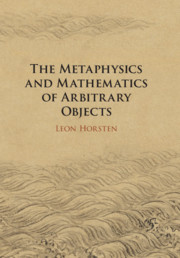Refine search
Actions for selected content:
2 results
3 - Arbitrary Objects
-
- Book:
- The Metaphysics and Mathematics of Arbitrary Objects
- Published online:
- 24 May 2019
- Print publication:
- 13 June 2019, pp 38-60
-
- Chapter
- Export citation

The Metaphysics and Mathematics of Arbitrary Objects
-
- Published online:
- 24 May 2019
- Print publication:
- 13 June 2019
